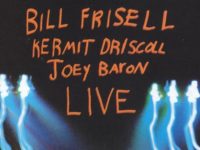by S. Victor Aaron
Bill Frisell is a guy I’ve been a huge fan of for about six or seven years, but the sheer volume, originality and wide range of his music has made it impossible for me to know where to begin when writing about him. There is not a guitarist of any stripe on the scene today who posseses such a unique sound from his guitar that it’s recognizable from the first note and draws from so many moods and influences. So what the hell, I’m going to start with where his discography ends at the moment, the August release from Blue Note Records, Floratone.
Floratone is a singular work Frisell’s catalog, which is to say, it’s a typical Frisell record, since most of them are idiosyncratic, anyway. For this outing, the unqiueness is less about the sound than how the sound was put together. A couple of years ago, Frisell got together with fellow Seattle resident Matt Chamrberlain for some jam sessions in the studio. Chamberlain comes from the world of pop and rock, having played extensively for Tori Amos, as well as some studio work for artists as diverse as David Bowie, Fiona Apple, Bruce Hornsby and Aaron Neville.
But those jam sessions were only the first part of the music making process. The improv tapes were handed over to long-time Frisell producer Lee Townsend and another producer, Tucker Martine. Townsend and Martine picked out the recognizable motifs and shaped them into songs through extensive editing, looping and mixing. At this point the record-making process follows the pattern first established by Miles and Teo for Davis’ early fusion classics, but Bill and company weren’t quite done yet. Frisell and Chamberlain augmented the songs further with additional guitar and percussion parts. Lastly, Frisell brought in frequent associate Viktor Krauss to add the bass parts and Ron Miles (cornet) and Eyvind Kang (violin, viola) to provide some orchestral colorings, not too unlike 2004’s Unspeakable.
The result is a record that sounds diametrically spontaneous and structured at once.
The “et. al.” in the title is acknowledgment of the fact that Frisell shares leader credit with Chamberlain along with co-producers Martine and Townsend. The CD is actually credited to “Floratone,” the same name they chose for the CD and the first track.
After listening to this album if you told me that this not a Frisell-led effort, you would have fooled me. There’s his gently slightly off-kilter Americana brand of avante garde jazz all throughout. The soundtrack-style soundscapes and subtle but effective studio treatments provide just the right motif for Frisell’s mastery of variable timbre. And true to form, Bill throws in such a wide variety of genres that it doesn’t matter what’s being mixed in because in the end, it’s just “Bill Frisell” music.
The title song that kicks off the CD is more in the reggae genre, but the dub-in parts and a faraway-sounding cornet give it a dark tone, and Frisell himself some sharp notes without getting too far out front. “The Passenger” is one of those signature atmospheric Frisell tunes that sounds like Brian Eno classical music with a Nashville attitude.
And then there’s Frisell’s swampy side, like the wonderfully bent backwoods ditty “Mississippi Rising,” the blues-sounding-but-not-blues “Louisiana Lowboat,” or the creole funk of “Swamped,” where Frisell plays Wes Montgomery-styled lines over a melodic theme that sounds a lot like Smokey Robinson’s “Way You Do The Things You Do.”
Chamberlain is no freeloader on this collection; his drums have great tonality and he’s a stickler for precision over risk taking. Combined with Frisell own strong sense of timbre and texture, Chamberlain is Bill’s kind of drummer. The percussive “Monsoon” is a perfect demonstration of his strengths, where his aggressive waltz combines with Frisell power chords that smoothly builds then recedes in intensity.
“The Future” and “Frontiers” are pieces that really shows off the studio audio imagery skills of Townsend and Martine, who created some distinctive grooves that rely more on textures then heavy rhythms.
Nevertheless, Floratone overall sounds like a mainline Bill Frisell album, if there is such an animal. The devil—or should I say—distinctions, are in the details, and it’s fun to listen for all the subtleties in this album where the players and producers left their marks. Bill Frisell, with some help from his cohorts, serves his fans another slice of that sweet, sublime weirdness that only he can deliver.
Purchase: Bill Frisell – Floratone
- Ivo Perelman + Tom Rainey – ‘Duologues 1-Turning Point’ (2024) - May 10, 2024
- Jeff Oster, Vin Downes + Tom Eaton – ‘Seven Conversations’ (2024) - May 6, 2024
- David Torn – ‘Adityahridayam 321’ (2024) - May 5, 2024



